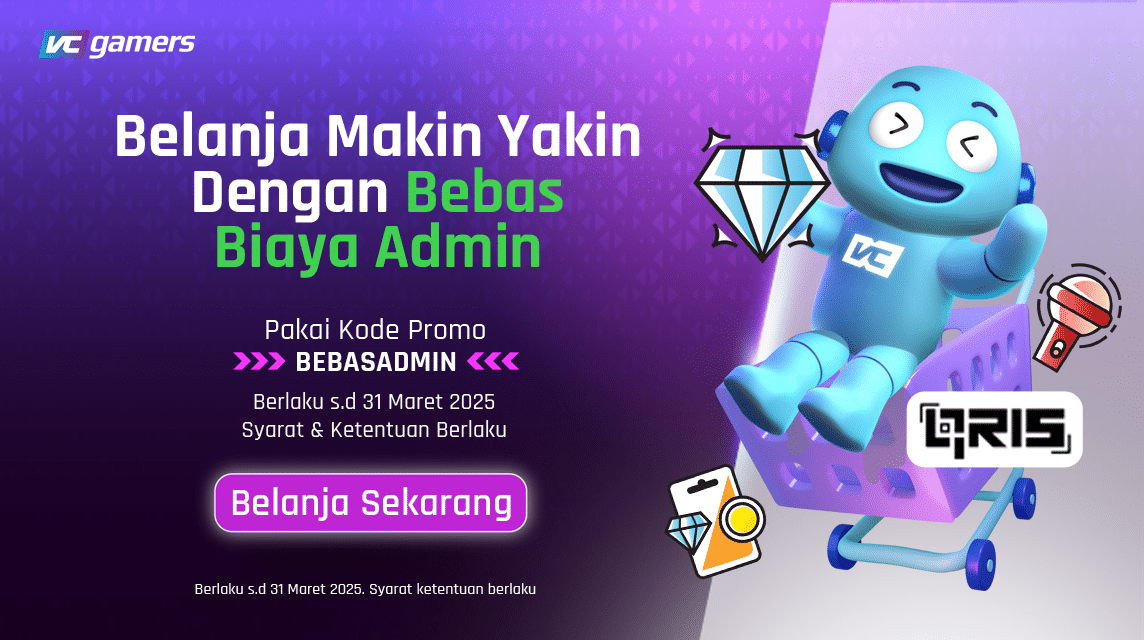The last decade has seen a significant increase in the variety of games available on PC, allowing players to play a wide variety of action, RPG, strategy, puzzle and sports games.
Single-player game titles allow players to progress through the story at their own pace, with games like Sekiro: Shadows Die Twice and Cyberpunk 2077 being prime examples.
On the other hand, multiplayer online battle arena (MOBA) is a genre that emphasizes teamwork and strategy. Games like League of Legends and Dota 2 have a large fan base worldwide and are known for their competitive nature.
Cheapest MLBB Diamonds!


 RudyStorez
RudyStorez

 TopMur
TopMur

 RudyStorez
RudyStorez

 RudyStorez
RudyStorez

 RudyStorez
RudyStorez

 TopMur
TopMur

 BANGJEFF
BANGJEFF

 TopMur
TopMur

 TopMur
TopMur

 RudyStorez
RudyStorezCard games have also spread to the PC world, with a variety of slot games and live dealer games appearing on recommended online game lists. Today, more and more players can enjoy the full card playing experience from their PC and mobile devices.
However, no matter what game you play, it’s important to choose the right hardware, optimize your system, and maintain it regularly to ensure optimal performance. Here are some pointers on how to do this, according to experts. Following these tips will ensure a high-quality gaming experience for all players.
High Quality PC Component Integration
To maximize PC performance, it is important to choose high-quality components.
The first consideration is the processor (CPU), which is the heart of all computing processes in a computer. It increases the ability to process game physics and various tasks simultaneously, resulting in a more enjoyable experience.
Next, the graphics card ( GPU ) is also important and directly contributes to improved image quality and stable frame rates. High-performance GPUs enable higher resolution gameplay and better real-time graphics processing.
Random Access Memory (RAM) also affects the system's reaction time and multitasking capabilities, so it is recommended to have a sufficient amount of RAM: the more RAM, the more data can be stored and accessed temporarily, allowing games and applications to load in time and increasing the overall responsiveness of the system.
Optimizing the Operating System for Gaming
First, it is important to identify unnecessary processes and applications running in the background of the operating system (OS) and disable them.
For example, reducing the number of applications that start automatically at start-up will reduce the load during boot-up and improve system response time.
Apps that constantly check for updates in the background should also be managed carefully, as they can cause performance degradation during gaming.
Regularly updating the operating system can improve system stability and efficiency, as well as enhance security.
Optimize Game Settings
During this process, it is important to get the right balance between graphics quality and system performance.
Adjusting the game resolution and graphic detail settings can reduce unnecessary resource consumption and ensure smoother gameplay.
Additionally, adjusting graphical settings such as shadows, texture details, and post-processing effects can also contribute to improved performance. Since these settings have a significant impact on the visual appeal of a game, it is important to adjust them appropriately for your PC's specifications.
If your graphics card is performance-limited, lower shadow settings can reduce screen choppiness and keep your gaming experience enjoyable.
Different games have different recommended settings, so it's important to understand the nature of each game and your PC's capabilities and adjust accordingly.
Hardware Upgrades
Regular hardware upgrades are essential to maximize your gaming experience. For example, high-performance graphics cards from NVIDIA and AMD can significantly improve performance in games with high resolutions and detailed graphical requirements.
Investing in a proper cooling system is also essential to maintaining system stability and efficiency while gaming. Powerful graphics cards and fast processors generate a lot of heat, which without effective cooling can degrade system performance and shorten the lifespan of your hardware. Therefore, using high-quality fans or a water cooling system is essential to prevent heat-related issues and keep your PC components performing optimally.
In general, water cooling systems provide better cooling than air cooling, especially in high-performance, overclocked PCs, and efficiently dissipate heat while keeping the system quiet.
Computer Care
Cleaning dust inside the PC is a routine task that must be done to ensure efficient heat evacuation and reduce the risk of damage. Dust, especially around fans and heat sinks, can significantly reduce cooling performance and should be carefully removed using a compressor or sprayer.
Hard drive defragmentation is also done to tidy up the file system and increase data access speed. Regular defragmentation is recommended, especially if using a mechanical hard drive, because fragmented files will reduce performance.
In addition, another important aspect of PC maintenance is the use of surge protectors to manage the power supply. Unstable power supplies and voltage spikes can damage sensitive components. Surge protectors help protect your PC from these problems and help maintain long-term reliability.
Network Optimization for Online Games
Optimizing the network environment is essential to enjoy online gaming to its full potential. First of all, it is essential to choose the right location for the router to ensure the stability of the internet connection. The router should be installed in a location with few obstructions and within close proximity to the PC or game console.
Additionally, using a VPN specifically for online gaming can also be beneficial: VPNs encrypt internet communications and ensure secure transmission, while optimizing routes to and from game servers.
Tips for Optimizing Your Gaming Space
A good gaming experience is not just about having high-performance hardware, but it is also very important to create the right environment in the gaming room. The goal is to create a gaming room that is comfortable for long hours of play, hot but relaxed, and conducive to improving performance.
- Proper lighting settings: too much direct light can cause eye strain, so indirect lighting is recommended. Choosing monitors and lighting that reduce blue light can also help prevent further eye strain.
- Comfortable gaming chair: It is important to choose a gaming chair with good support features that will not cause fatigue after sitting for a long time. Proper support for the hips and back will reduce the strain on the body and allow you to enjoy gaming longer and more comfortably.
- Effective sound system: A speaker system or headphones that deliver clear, three-dimensional sound is essential for immersive gaming. In particular, headphones with noise-canceling features that block out ambient sounds can help you concentrate better.
- Proper monitor placement: Ideally, your monitor should be positioned at eye level. Adjusting to a position where your gaze naturally falls towards the center of the monitor will reduce strain on your neck and shoulders, and ensure a comfortable experience.
- Adequate space and organization: Keeping your gaming space clean and free of clutter will help you stay focused. Be careful not to spill food or drinks on your computer. It is also important to organize your space so that necessary accessories are easily accessible.
Enjoy Playing Games Like A Pro
By using these tips effectively, an ordinary room can be transformed into a dedicated space that offers a professional-level gaming experience. By creating a comfortable gaming environment, you can enjoy playing games for hours with ease. In addition, a comfortable and functional space can also serve as a refuge from everyday stress. It is also a great place to make new friends through online gaming and serves as a communication center.








